Pub Theology 11/19/24 -- What can we learn from atheists?
Peter Trumbore • November 19, 2024
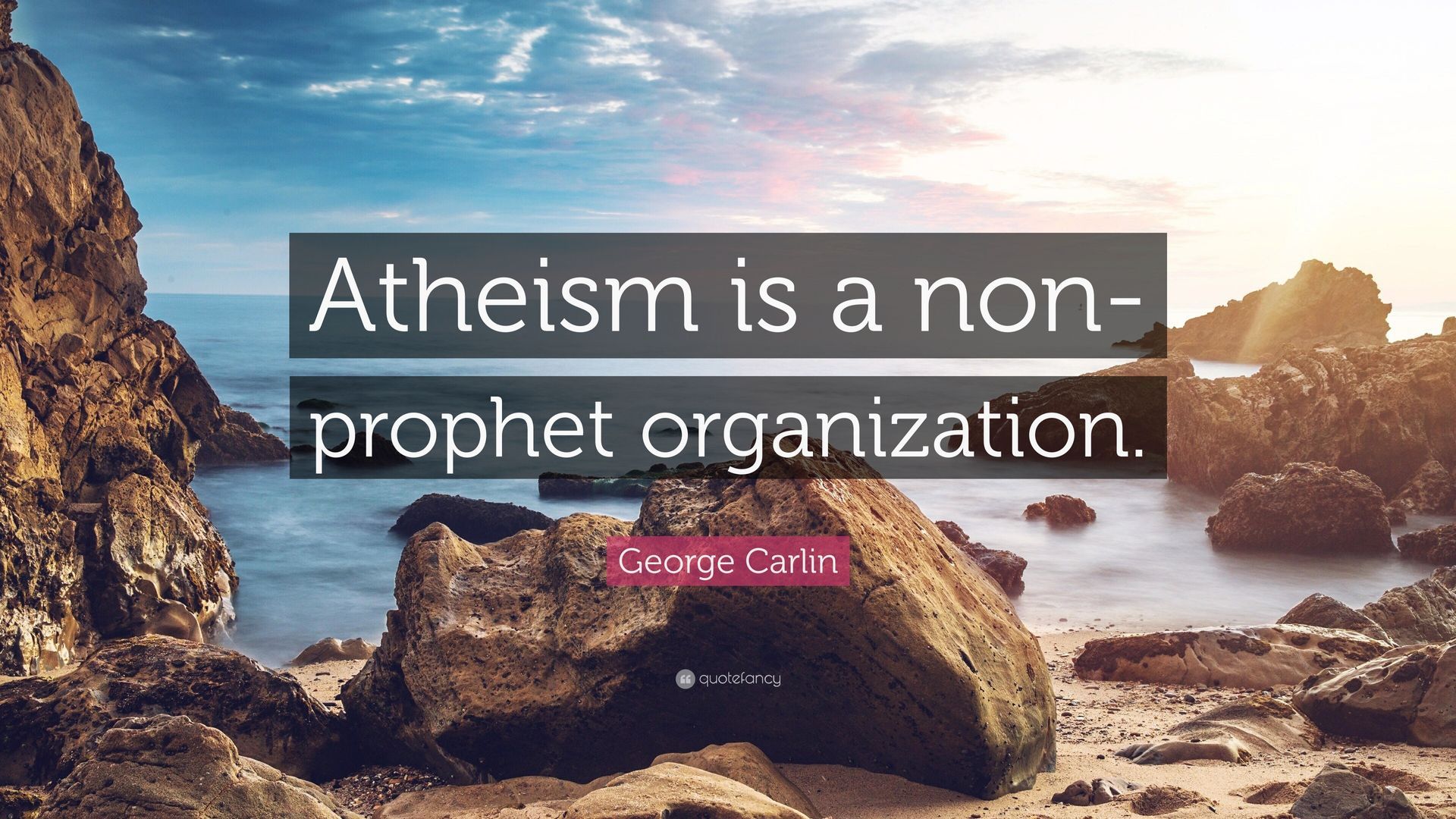
For more than a decade now, our conversations have for the most part progressed from a perspective that puts belief in God at the center and builds from there. So let's talk about godlessness instead. We first took on this topic all the way back in 2014, and since that time we've had the pleasure of getting to know and having several atheists join us for our discussions from time to time.
Here are some specific questions:
- Do atheists get respect in our culture? Why or why not?
- Why don't they "get it" the way that we do? In other words, what the basis for unbelief?
- If there is no God, no divine, are our lives cosmically irrelevant? In the big picture, does life have a point? Is there a cosmic, transcendent purpose or meaning to our lives, or is this it?
- How willing are we to believe the unbeliever? Listening is one thing, but believing another. Let's talk about the difference.
Finally, here's the really big question: What can people of faith learn from those who profess none? Join us for the conversation this evening, starting at 7pm, at Casa Real in downtown Oxford.
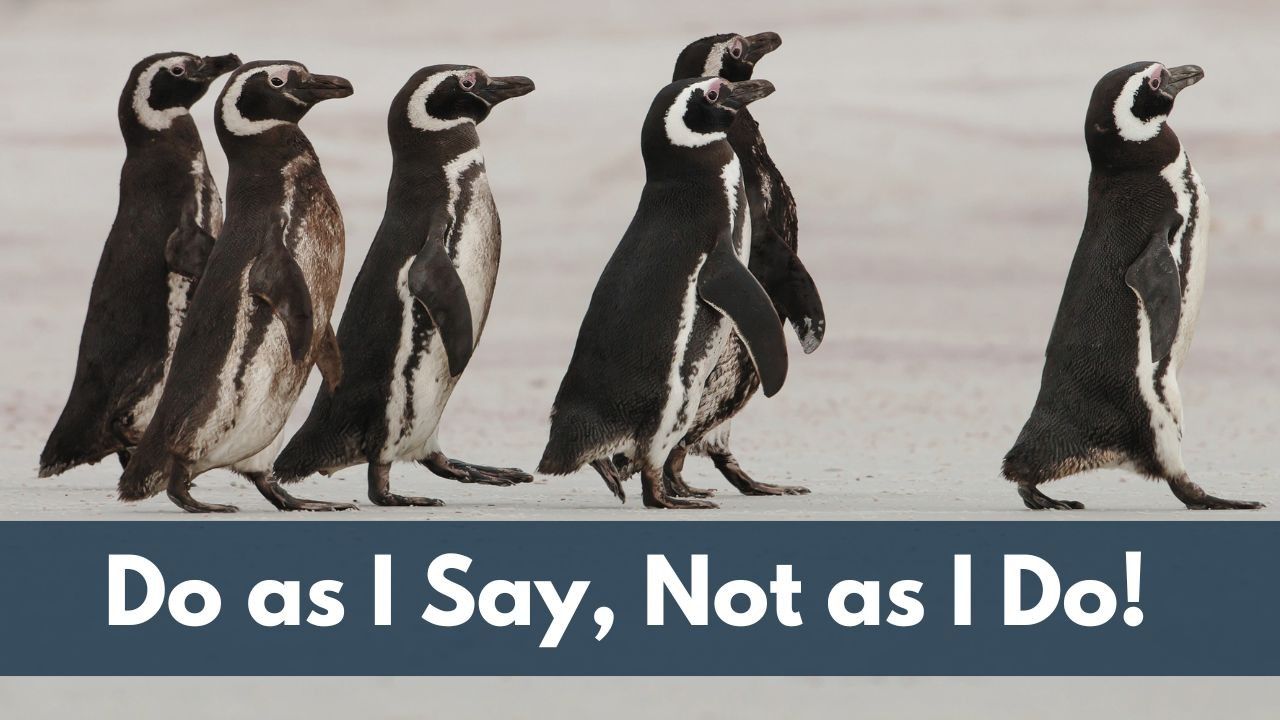
I imagine we're all familiar with the slogan WWJD, or, What Would Jesus Do. In fact, it's so familiar that it's turned into a cliched bit of pop culture replicated on wristbands, inspirational posters, bumperstickers, and so on. But have you heard of WWJI, What (or Who) Would Jesus Imitate? OK, true confessions time, I made that one up. But stick with me for a minute. I got to thinking about this after reading an article at the website Mockingbird titled "Are you a Follower or a Fan: Imitation vs. Participation." The piece starts off by acknowledging the very real challenges of being modern people trying to do as Jesus did. The author writes: "A few Sundays ago, I listened to a homily that drew a sharp distinction between being a mere fan of Jesus and being a true follower. The preacher’s message was clear: admiration is not enough; commitment is required. And yet, as I sat there, I couldn’t help but think that this framing, while stirring, glossed over the profound complexities of discipleship. After all, what does it truly mean to follow a first-century prophet who renounced self-protection, rejected wealth, and issued radical moral demands? It’s one thing to nod along in agreement; it’s quite another to live as he did. After the service, I mentioned to a fellow congregant that I don’t consider myself a follower of Jesus — just a fan. And only on my better days." A little further on, the author raises what is a profound and I think fundamental question about the nature of Christianity and what it means to be a Christian. "Is Christianity about imitating Jesus or participating in Jesus? Is it primarily following a moral example or being swept up into an unfolding mystery?" As the author notes, this is about the fundamental tension of Christian life. The idea of imitation is that Christian life is about emulating Jesus, replicating his actions, embodying his virtues, and modeling our behaviors after his. Hence the WWJD paradigm. But there's a problem there. This mindset reduces "Christianity to a moral project focused on individual actions and ethical conduct. While imitation is undeniably valuable, when it becomes the core of the Christian journey, it risks turning faith into little more than a moralistic exercise — a set of rules to follow rather than a living, transformative experience." This approach is also, at its core, a specifically individual exercise. In short, how can I be like Jesus? Participation, the author writes, is a radically different approach that reframes the Christian experience. "It’s not about striving to mimic Christ’s life, but about engaging in the ongoing mystery of his presence in the world. The believer isn’t just a disciple learning to imitate an ancient figure but a participant in a larger, living story — a story that transcends time and encompasses both the individual and the collective." While imitation offers a clear moral framework, it risks reducing our faith to a checklist of behaviors. Do these things (what Jesus would do), replicate these actions, and we're set. Participation, the author writes, "pulls believers into something dynamic and ongoing. It’s not about asking 'What would Jesus do?' but 'What is Jesus doing right now?' It’s about recognizing that faith is not just a story to be retold, but a mystery to be lived and actively engaged with in the present." So where are you in this mix of imitation vs. participation? How different are the two? Does participation mean we discard imitation? Or does participation give meaning to imitation. If imitation is about me, myself, and I, who is participation about? Are you a fan or a follower? We will wrestle with these questions in our discussion this week. Join us for the conversation tomorrow evening, Tuesday, April 22, starting at 7pm at Casa Real in downtown Oxford.
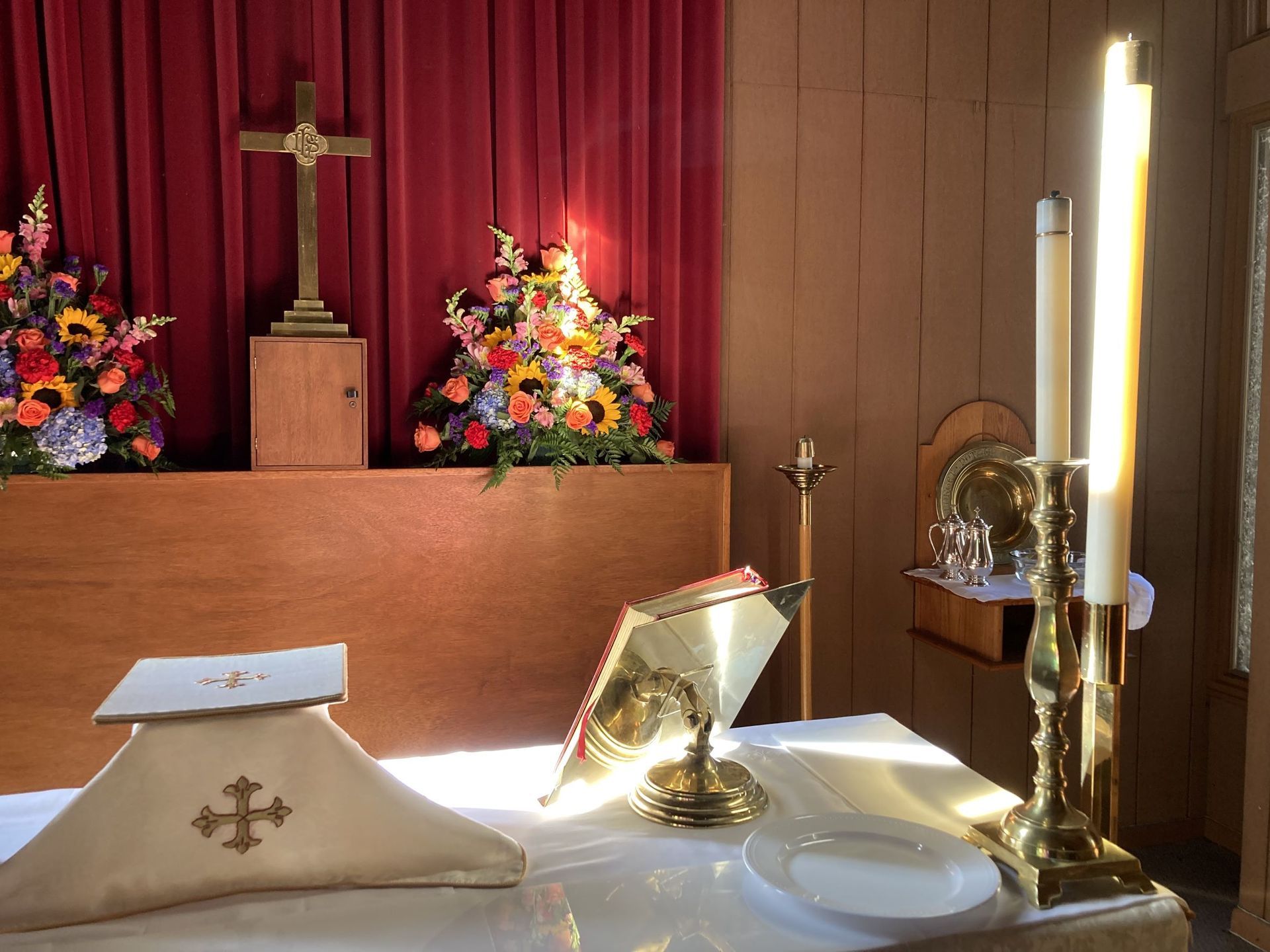
This Sunday, all are welcome to join us for a morning of worship and fellowship. Whether you are with us in the sanctuary or joining from afar, your presence strengthens our community. Our services are at 8:30 & 10:00 a.m. We warmly welcome those who cannot attend in person to join us via our live stream for the 10:00 a.m. service.

This Sunday, all are welcome to join us for a morning of worship and fellowship. Whether you are with us in the sanctuary or joining from afar, your presence strengthens our community. Our services are at 8:30 & 10:00 a.m. We warmly welcome those who cannot attend in person to join us via our live stream for the 10:00 a.m. service.
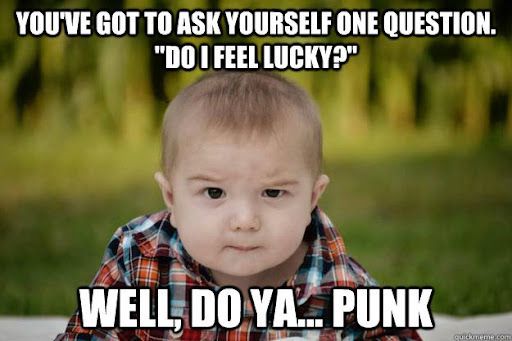
What I really wanted to do here was post a Clint Eastwood meme, to illustrate this week's topic, but I sort of thought the handgun in every single one I found would be in a little bad taste. So instead we get a toddler with a serious expression. But the question still holds: Do you feel lucky? Luck is one of those things that comes up pretty often in our daily lives and conversations, so I think we tend to take it as something both real and that we take for granted. Some people are lucky, some people aren't. Sometimes we're out of luck, sometimes we luck out. But what is luck anyway? Believe it or not, this is something that sociologists have been arguing about for some time, and that philosophers have explored, but without much resolution. An article at the New York Magazine website goes into this discussion in some really interesting detail: "There’s something about luck that inspires skepticism or rejoinder. Partially, it’s a question of terms. It’s hard to agree what exactly we’re talking about. The word is slippery, a kind of linguistic Jell-O. The critiques come from left and right, from those who see luck as a mask for privilege and those who see it as an offense to self-made men. Voltaire, with the confidence of the encyclopedist, once declared that one can locate a cause for everything and thus the word made no sense. Others dismiss it as mere statistics, still others as simply a term the godless use for God. It can call to mind an austere medieval manuscript, two-faced Fortuna, one side beaming, the other weeping, ordinary humans clinging to her fickle wheel. But we can’t quite quit it, either. It’s something you might say you don’t believe in but continuously invoke. We’re up all night to get it, are warned not to push it, are sometimes down on it. It haunts our pop songs and expressions, but it isn’t just some rhetorical holdover, like the bony stub of an ancestral tail. This organ is still in active use." As the article notes, we can be tempted to dismiss the notion of luck as occurrences that are the product of simple probabilities, even wildly improbable ones. But our minds don't really process the world that way. Rather that see the world through the lens of mathematical probabilities, we experience and understand the world through story and narrative. And luck, good or bad, makes for a powerful plot point. We're going to talk about this idea of luck in our conversation this week. Is it different than destiny or fate? Is it the hidden hand of God for our against our favor for some inexplicable, at least to us, reason? And, of course, we're going to ask the all-important question: Do you feel lucky? Do ya punk? Join us for the discussion tomorrow evening, Tuesday April 8, starting at 7pm at Casa Real in downtown Oxford.

This Sunday, all are welcome to join us for a morning of worship and fellowship. Whether you are with us in the sanctuary or joining from afar, your presence strengthens our community. Our services are at 8:30 & 10:00 a.m. We warmly welcome those who cannot attend in person to join us via our live stream for the 10:00 a.m. service.
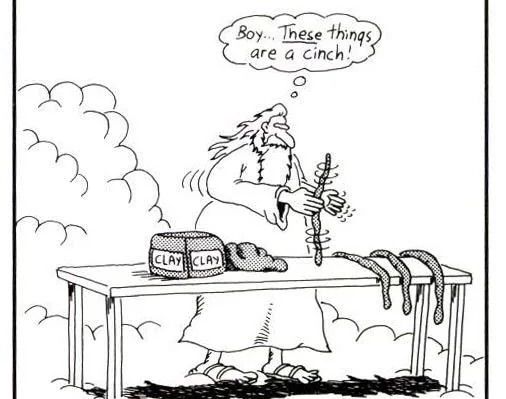
It's not every year that our Pub Theo conversations fall on April Fools Day, but here we are. In fact, near as I can tell, the last time this happened was in 2019, you know, those glorious pre-pandemic days before everything started to fall apart and we all lost our senses of humor. It is sometimes suggested that worship is holy and serious stuff, and that church is no place for jokes. What's your take? How serious, or how lighthearted can we be or should we be? Is there a place for humor in church? Better yet, let's take our questions right to top. In short, does God have a sense of humor? What would you point to as evidence for your answer? And does that tell you anything broader about how you think about God and your relationship with the divine? There is a long debate about the role of humor in the Christian faith. Seriously, people argue over whether Jesus laughed or not. (For what it's worth, the Bible doesn't offer us any examples of Jesus laughing, let alone smiling, but that doesn't mean he didn't.) Over at the website Patheos, there's an interesting article about irreverence, faith, and what we want our relationship with God to be like. This line from the article resonates: "But we only get a cardboard cutout Jesus in scripture—to see him as a human being, I think some irreverent thoughts. Given that we human beings are flawed, imperfect, and funny to our toes but have perfectionist delusions, irreverence is a universal humanizer." So in our discussion this evening, we're going to talk about humor and the place of irreverence in our religious and non-religious lives. This conversation will be no joking matter! Join us this evening starting at 7pm at Casa Real in downtown Oxford.

This Sunday, all are welcome to join us for a morning of worship and fellowship. Whether you are with us in the sanctuary or joining from afar, your presence strengthens our community. Our services are at 8:30 & 10:00 a.m. We warmly welcome those who cannot attend in person to join us via our live stream for the 10:00 a.m. service.
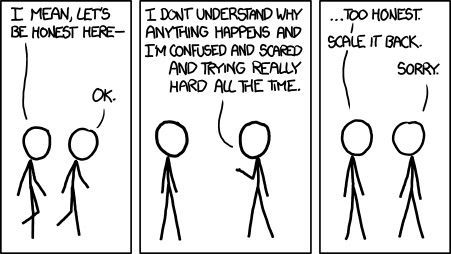
From an early age we're taught that honesty is the best policy. But is it? From a social and psychological perspective, the benefits of honesty seem pretty straightforward . Honesty builds trust. This can in turn lead to stronger relationships with family, friends, coworkers, and so on. Likewise, when we are honest with ourselves, we build trust in ourselves which can lead to better mental health and helping you lead a more authentic and more fulfilling life. But are there circumstances where holding back, or scaling back the honesty, as the XKCD comic above puts it, is the better way forward? In short, is it sometimes better to be less honest, both with others and with ourselves? For example, in a review of a new novel by Emily St. James, Atlantic writer Emma Sarappo reminds us that "Many LGBTQ people face a lifetime of moments that require them to weigh honesty against safety," a dilemma that is particularly acute and dangerous for trans people in this very moment. We're going to talk about all of this in our conversation this week. What is your relationship with honesty? Are there times in your life where you feel like you've been too honest? More importantly, what does it mean to you to be honest and to live honestly? And how do we do it? What gets in the way? Join us for the discussion tomorrow evening, Tuesday March 25. The conversation starts at 7pm at Casa Real in downtown Oxford.

This Sunday, all are welcome to join us for a morning of worship and fellowship. Whether you are with us in the sanctuary or joining from afar, your presence strengthens our community. Our services are at 8:30 & 10:00 a.m. We warmly welcome those who cannot attend in person to join us via our live stream for the 10:00 a.m. service.
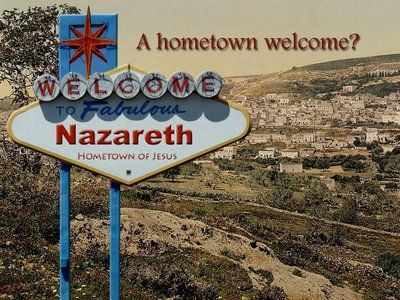
We've been at the whole Pub Theology thing for nearly a dozen years now (we first gathered all the way back in the summer of 2013), and we've covered a lot of ground and a lot of topics in our conversations over that span of time. Sometimes those topics are worth revisiting. I got to thinking about that on Sunday listening to the Gospel reading (Luke 13:31-35) and hearing Jesus refer to Jerusalem as the city that kills its prophets. And it's true. Prophets get a rough treatment in scripture, what with being ignored, exiled, killed and so on. Even Nazareth, Jesus' hometown, was not particularly interested in hearing what he had to say. It turns out that this issue has been on our agenda before. Almost exactly six years ago, back in 2019, we had a discussion on the topic of prophets and their often rocky reception. But since we've got some new faces around the dinner table these days, it's worth revisiting this conversation. As noted earlier, Jesus himself, in the Gospel of Luke, says "no prophet is accepted in his hometown." And in his case, the good people of Nazareth tried to throw him off a cliff. Likewise in the Gospel of Matthew Jesus says, "Only in his home town and in his own house is a prophet without honor." And, as already mentioned, in Luke, Jesus describes Jerusalem as the "city that kills the prophets." What's behind this scorn for prophets anyway? Perhaps it's this: One piece I recently read described the essence of being a prophet as engaging in "denial-free thinking." Or perhaps, as we brought up some weeks ago, maybe it's because they insist on speaking hard truths that people might not want to hear. Maybe those insights have something to do with it. So for our discussion this week we're going to talk about prophets. What do you think it means to be a prophet in our modern age? Do we even encounter them anymore? What's our reaction? We're familiar with prophets in the religious sense, but what about secular prophets? Do they get the same kind of unwelcome response? Can you think of any in our present day? I'm pretty sure I can. Join us for the conversation tomorrow evening, Tuesday March 18, beginning at 7 pm at Casa Real in downtown Oxford. To get you thinking, here's a link to a long book excerpt which raises some interesting notions about the rejection or acceptance of prophets. I won't vouch for all of the arguments, but it's worth a read if you have the chance.
